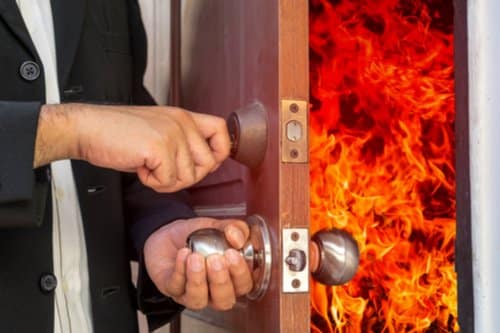Tempting, isn’t it, when people are going to and fro a lot? But wedging open a fire door is illegal as well as dangerous.
Fire doors save life and property, but only if used properly. The Fire Door Safety Week Campaign aims to make sure building occupants and managers understand how they work. Here are some things to think about if you live in a block of flats.
- Understanding that they create a vital barrier from smoke and toxic fumes and allow time for safe evacuation or staying put, as per the building’s fire policy.
- Knowing how the work so you won’t be tempted to make even a small change which can have a big effect on how well they perform.
- Knowing where to expect to find fire doors – and to respect them.
- Recognising them. While fire doors in common areas will have signs on them, front doors to flats and fire doors within flat do not, but they are just as important.
- Knowing who is responsible for them – it could be you as a freeholder, managing agent or RMC director.
- Knowing your lease: front doors to each flat must of course be fire doors, and individual leaseholders might be responsible for maintaining them.
- Checking the cold smoke seals which look and feel like a brush or plastic fin.
- Checking the automatic closers that must be fitted to all fire doors.
- Regularly Doing the five-step basic check on certification, gaps, seals, hinges and closers.
- Knowing where to go if you are unsure that your block is well protected: the local authority or fire service is a good first port of call.
Invalidating insurance
In the event of a fire, it is quite possible that an insurer would be unwilling to pay for damages when a door has been wedged or propped open. The majority of fire doors will hold a fire in a room for 30 minutes by which time the fire and rescue service will be on site. Wedging open doors can cause a chimney effect, which can cause fire to spread rapidly, and destroying entire buildings.
General fire safety in your block
The Regulatory Reform (Fire Safety) Order 2005 requires the Responsible Person (RP) of any commercial premises (and that includes blocks of flats) to carry out a fire risk assessment, including measures to reduce or eliminate the risk of fire, and identify persons at risk.
If you’re concerned by this, we can happily make arrangements for a professional inspection for you, simply email or call us free on 08000 92 93 94, or download a copy of our Fire Risk Assessment fact sheet here.
FP313-2018
The sole purpose of this article is to provide guidance on the issues covered. This article is not intended to give legal advice, and, accordingly, it should not be relied upon. It should not be regarded as a comprehensive statement of the law and/or market practice in this area. We make no claims as to the completeness or accuracy of the information contained herein or in the links which were live at the date of publication. You should not act upon (or should refrain from acting upon) information in this publication without first seeking specific legal and/or specialist advice. Arthur J. Gallagher Insurance Brokers Limited trading as Deacon accepts no liability for any inaccuracy, omission or mistake in this publication, nor will we be responsible for any loss which may be suffered as a result of any person relying on the information contained herein.
